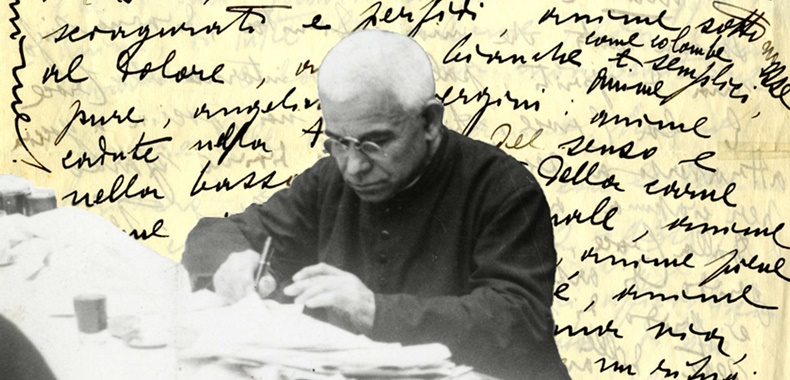AN UNMISTAKABLE STYLE

Presentation of A Priceless Treasure Don Orione. Letters & Writings.
From: Ignazio Terzi, Presentation of A Priceless Treasure Don Orione. Letters & Writings, London, 2000, (vol. 1 p. 352; vol. 2 p. 352)
If “the style is the man”, as Buffon says, then Don Orione, who was certainly, even on a human level, an “unmistakable” person, also had an “unmistakable” style. In fact it is not difficult to discover in his writings characteristic traces of his strong personality: geniality, an iron will, holy audacity, pertinacity and a particular intuition regarding times and men. These could be some, if not all, of the principal aspects of his character. These elements can also be found in Don Orione, the writer.
Don Orione did not have any artistic intentions when writing, leaving traces of himself in the world of literature. His ideals are on a much higher plane. He speaks “ex abundantia cordis” with all the sincerity, the ardour, the passion of his great soul which makes his writing only and always a means towards his highest goals: the glory of God, the salvation of souls, the development of the Church.
His themes are substantially his loves. It is logical therefore that when Don Orione picks up the pen, it is with that same spirit with which the Priest takes up the apostolic instruments of his sacred mission.
The style depends also on the “thing” in question - or so it is said. The pages of Don Orione vary greatly whether dealing with strong and impressive themes, such as social problems, or the duties of religious or Christians in respect of eternity and divine judgement, or if the theme regards sweet or delicate matters, such as devotion to our Lady, pity towards the poor or even his own personal memories of his family or apostolate.
All these indications can be found in this collection of letters and writings, some of the more significant pages from the rich collection of writings of the Founder of the Little Work of Divine Providence. This priceless treasure is now finally available in English, having already been published in Italian, Spanish, Portuguese and Polish. This publication is intended for the vast circle of those who already know about Blessed Luigi Orione and also to those, interested in the historical and spiritual events in the life of the Church, wishing to meet with an eminent personality from the social and ecclesial scene of this century. His first biography, which appeared in England in 1952, was written by Douglas HYDE with the original title God’s Bandit (Peter Davies, London, 1952).
Don Orione was born in 1872 and died in 1940. Italian by birth, through the universality of his Christian experience, he became in tune spiritually and managed cultural dialogue and active interest in numerous peoples: from Italy, Argentina, Brazil, Uruguay, Poland, Palestine and also Britain. His first religious came to this last in 1936 (to Cardiff and South Wales) and currently his religious Family are present with diverse communities involved in social work, and the care of the humble and the least.
This publication is in answer to a widespread need because, during these last few years, the Congregation of Don Orione (religious priests, brothers, hermits, active and contemplative sisters, consecrated lay people) are expanding their work in many English speaking nations: other than Britain and Ireland, there is also U.S.A., the Philippines, Jordan, Kenya, Australia...
The writings of Don Orione are easy to read. From a stylistic-literary point of view, he is ordinarily pragmatic and paternally sure, but he knows how to assume various tones, guided by the theme to hand: he moves from lyrical and mystical tones on strictly spiritual themes to themes almost revolutionary in certain letters of social interest; he knows how to express himself with harmonious, flowery phrases, adapted to simple people, becoming prophetic and triumphal when looking to the future, inspired as he was in the primacy of Divine Providence in the history of the Church and society. But the common denominator remains constant: the passionate personality of the man who is always great, always strong, always believing, whatever the subject matter.
The life of Don Orione, his complete giving of self to God and his brothers, his total and constant holocaust are evident from his writings and give to his letters a leading position among the ascetic writings of the last two centuries.
Dostojewski said of himself: “I think like a poet”. Don Orione would have said: “I think like a believer”, but giving to the expression all the depth and breadth with which he gave it meaning in his life. A Christian, an ecclesiastic, an apostle all the way to the core of his soul!



